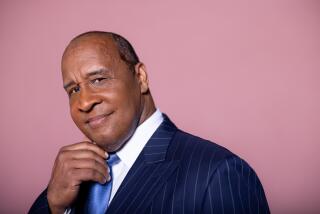‘87 Inglewood Election Dispute Escalates
- Share via
More than a year after a judge annulled the election of Inglewood City Councilman Ervin (Tony) Thomas, one of the most dramatic and complicated election cases in the history of Los Angeles County has entered a new round.
Appeals were filed last year by the city of Inglewood, Thomas and candidate Garland Hardeman, and now the filing of written arguments has begun. In a brief submitted Sept. 30, a lawyer for Thomas asked a state District Court of Appeal to overturn the decision by Superior Court Judge Leon Savitch that annulled Thomas’ June, 1987, election.
Savitch threw out 31 Thomas votes in his ruling last October, which implicated Inglewood Mayor Edward Vincent and other Thomas supporters in Election Code violations. The case was brought by Hardeman.
Though complete records are not kept, the decision appears to be the first annulment of a city council election in Los Angeles County since at least World War II.
Thomas remains 4th District councilman pending the appeals, which also postponed Savitch’s decision ordering a new election.
Hardeman maintains that election law required Savitch to declare him the winner because the decision left him with more votes.
Hardeman--who declares himself the “de facto councilman”-- has asked the appellate court to expedite the appeal, saying Thomas is illegally occupying the council seat.
While Thomas’ attorney Robert Stroud filed his opening argument by the Sept. 30 deadline set by the appellate court, lawyers representing the city of Inglewood had not filed their arguments as of Friday. After the period for written arguments and responses ends in about six weeks, a panel of three justices will hear oral arguments.
Attorney Edward Lascher, who is representing Inglewood, said he hopes to submit his court papers Monday. He dismissed as “utterly absurd” Hardeman’s charge that the city is trying to keep Thomas in office as long as possible through delays.
“We are trying to prepare a good brief, not a fast brief,” Lascher said Thursday.
Hardeman, a Los Angeles police officer, has repeatedly called for Thomas, a merchandising analyst, to step down.
Both sides predict victory in court, with Vincent and Thomas denying any wrongdoing. Thomas said last week that the appellate court will find that Thomas’ rights to due process were violated during the trial.
In separate actions, the Los Angeles County district attorney’s office is reviewing the trial transcript in an ongoing investigation into alleged Election Code violations by the Thomas campaign, a spokesman said Thursday. In addition, the state Fair Political Practices Commission is conducting an inquiry into whether Vincent and Thomas properly reported contributions by Vincent to the Thomas campaign.
Thomas overcame Hardeman’s more than 2-1 margin at the polls June 16 with a flood of absentee ballots that left Thomas the winner, 626 to 610.
The absentee ballots are the focus of the legal battle waged by Hardeman and his attorneys.
Trials in which election results are challenged emphasize speed and discard many standard procedures. Lawyers in this case complain they did not have enough time to prepare for a hectic 5-day trial.
After hearing testimony from Thomas, Vincent, Hardeman and many 4th District voters, Savitch threw out 58 votes: 31 for Thomas and 27 where he found that evidence was inconclusive as to who had received the votes.
Savitch ruled that Thomas campaign workers illegally hand-delivered absentee ballots for voters, told voters to punch and sign the ballots of absent family members, took ballots away unsealed and illegally registered voters during a massive drive for absentee votes.
He also threw out votes in which voters voted twice, where votes were cast using Thomas campaign headquarters in a commercial building as an address, and where a handwriting expert testified that ballot signatures did not match signatures on absentee ballot applications.
In his written argument, Stroud asks the appellate court to declare Thomas’ election valid because of alleged errors and abuses of discretion by Judge Savitch.
Stroud focuses on an issue that has also been a target of Hardeman’s lawyers: Judge Savitch’s clearly expressed displeasure with absentee vote laws.
Savitch cited “ambiguities” in the law in refusing to name Hardeman the winner despite an Election Code section that appears to call for such a remedy.
According to Stroud’s written argument, the judge’s attitude toward absentee voting “completely prejudiced (the) defendant’s case. The case was decided on the basis of . . . what could have happened rather than on the basis of truly reliable evidence presented in the trial court.”
Stroud also argues that Savitch denied Thomas a fair hearing by ruling for Hardeman based on insufficient evidence and withholding rulings on issues raised during the course of the trial. He says Savitch impeded defense attorneys by refusing requests for more time to investigate the charge that Hardeman was not living in the 4th District when he was a candidate.
Vincent’s active presence in Thomas’ absentee ballot campaign also became an issue in the trial.
Stroud argues that based on his ruling, Savitch apparently felt there was a “preconceived invalidity” about the “mere participation” of Vincent in the campaign.
Savitch ruled four votes illegal and found intimidation and/or invasion of ballot secrecy in cases where testimony showed that Vincent went to voters’ homes soliciting absentee votes for Thomas. In one case, voters testified that Vincent punched their ballots for them.
More to Read
Sign up for Essential California
The most important California stories and recommendations in your inbox every morning.
You may occasionally receive promotional content from the Los Angeles Times.













